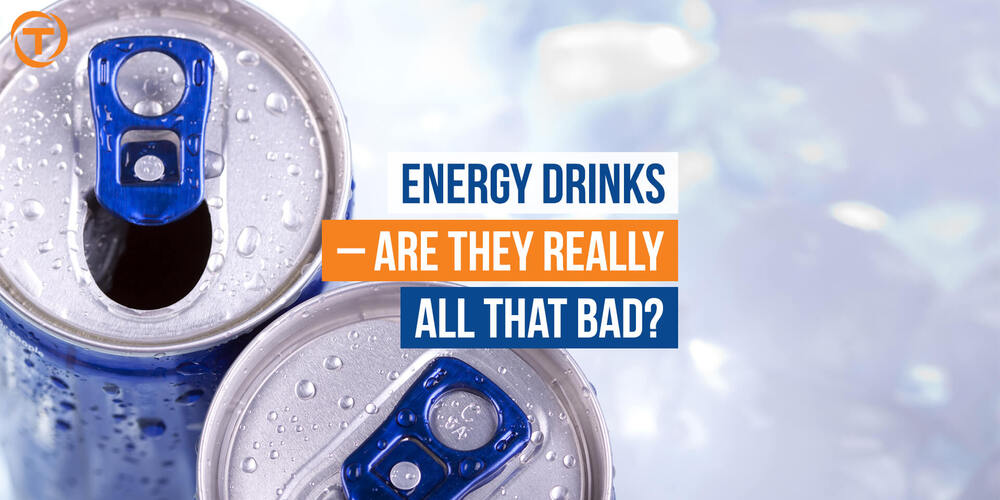Energy drinks boost energy, alertness and concentration in one convenient hit. However, these drinks have earned themselves a bad reputation over the years with horror stories of excess consumption. While there have been organic versions released – the question still remains, are they harmful? After all, we’ve heard that drinking up to four coffees a day is healthy, so what makes energy drinks any different?
Energy drinks usually contain high levels of caffeine and sugar. They may also include ginseng, B vitamins, taurine (an amino acid that boosts metabolism), green tea extract, guarana and gingko biloba. Many of these ingredients make claims to reduce mental fatigue, boost memory, stimulate weight loss and increase energy.
It is no wonder these drinks are made readily available on worksites and in industries such as construction, transport, agriculture and mining where a quick surge of energy may be needed.
However, it is important to know the risks and benefits of these drinks, especially when consumed in large quantities. Here are the known effects of energy drinks and how they may affect your work:
The caffeine may improve memory and reaction times.
Research from Harvard's School of Public Health shows caffeine can increase your endurance and strength, improving your reaction time and delay mental fatigue. One study even found that drinking one 500mL can of energy drink increased both concentration and memory by 24 per cent.
However, studies have also shown that excessive energy drink intake can lead to heart problems as a result of the increased levels of caffeine. Further it can cause you to feel agitated and irritated as well as reduce the steadiness of your hands.
Sugar causes brain fog and fluctuating energy levels
While too much sugar is linked to a bunch of health conditions such as obesity and diabetes in the long term, the consumption of too much sugar can actually harm your workplace performance.
When we give our bodies an instant hit of sugar in the form of an energy drink it can spike insulin levels which leads to the “crash-like” feeling an hour or so later – making our bodies crave more sugar to relieve the slump and creating a vicious cycle. The 3pm slump, the crash after a sugar fix and fluctuating energy levels can prevent us from being present, alert and focused on the job.
Further, if you are watching your carb intake, then energy drinks may not make it on your preferred beverage list. Energy drinks can contain up to 63g of sugar in a single serve - the same amount of sugar as two mars bars.
Workplace safety could suffer
Often energy drinks are used to mask a wider problem of fatigue and sleep deprivation. Energy drinks can pep us up after a bad night sleep or a night of partying or gaming but are hiding the underlying issue.
Sleep deprivation increases your chances of having an accident by 70%, make you more likely to be short with your boss or co-workers and more likely to make bad decisions. Unfortunately, an energy drink cannot fully undo the impacts of sleep deprivation, especially over the course of a day.
Further, researchers found that given the long working hours and reduced sleep hours of workers, the intake of energy drinks may also worsen sleep, creating another vicious cycle. To counteract the lack of sleep, we consume more energy drinks creating an ongoing dependency.
So, what’s the verdict?
From a health perspective, it's recommended that adults consume no more than 400mg of caffeine a day, typically a maximum of two energy drinks or four regular coffees. It is also recommended that we keep our sugar intake to between 25 and 35g of sugar - some energy drinks contain double the daily recommended intake in one serve.
From a work perspective, there may be some short-term benefits for consuming energy drinks however you are unlikely to perform at your best based on an excessive intake of caffeine or sugar. Perhaps not ideal but also unlikely to be detrimental.
Where energy drinks are being used out of necessity to overcome sleep deprivation, fatigue and failing energy levels, consumption could ultimately become a safety issue – which is a far more serious consequence.
The odd energy drink now and then is unlikely to significantly harm your work performance, though it is recommended that you check the ingredients carefully, consume in moderation and keep in mind there may be some healthier alternatives that offer similar benefits.
If you are open to new opportunities, contact a recruitment agency like Trojan Recruitment Group and receive advice from the experts in labour-hire, permanent and contract staff.
Sources
https://www.hsph.harvard.edu/nutritionsource/energy-drinks/
https://www.healthline.com/nutrition/energy-drinks#TOC_TITLE_HDR_3


